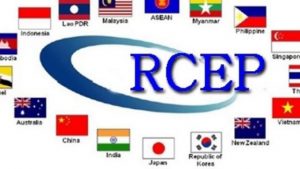Regional Comprehensive Economic Partnership (RCEP):

South Korea has said that it regrets India’s absence from the Regional Comprehensive Economic Partnership (RCEP) and hopes to see New Delhi rejoin the agreement.
- The RCEP came into effect on January 1, 2022, marking the formation of the world’s largest free trade zone in terms of trade volume.
- India withdrew from the RCEP in 2019 largely because of concerns it would open it up to Chinese goods amid an already wide trade imbalance with China, and the failure of the agreement to adequately open up to services.
- India had “a crucial role” to play in helping the region build an inclusive architecture at a time of increasing global instability.
- Such trade pacts will also give Indian companies a platform to showcase their strengths across even larger markets.
- Besides, Rising U.S.-China tensions were “deeply worrying” for the region with the pandemic resulting in “heightened tension”.
- RCEP is a trade deal between the 10-member Association of Southeast Asian Nations (ASEAN) and China, Japan, South Korea, Australia and New Zealand.
- RCEP will cover about 30% of global gross domestic product (GDP), worth $26.2 trillion (€23.17 trillion), and nearly a third of the world’s population, some 2.2 billion people.
- Under RCEP, around 90% of trade tariffs within the bloc will eventually be eliminated.
- RCEP will also set common rules around trade, intellectual property, e-commerce and competition




